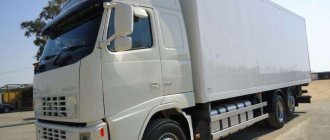Engine characteristics
The table below presents the technical characteristics of this power unit.
| Manufacturer | Isuzu |
| Type | inline four |
| Release | new, starting from 2008 |
| Volume | 4334-4570 cm3 (4.4-4.6 l) |
| Power, kW/hp | 83/121 |
| KM, Nm | 322 at 4200 rpm |
| Weight, kg | 377 |
| Compression ratio | 19 |
| Nutrition | diesel, injection pump |
| Ignition | Double Ignition System 2 |
| Number of cylinders/valves | 4/2 |
| Engine material | cast iron, duralumin, steel |
| Layout | SOHC, overhead camshaft |
| Cylinder diameter | 115 mm |
| Pistons | cast aluminum |
| Crankshaft type | on 5 supports, steel, 8 counterweights |
| Piston stroke | 110 mm |
| Environmental standards | Euro 2 |
| Fuel consumption, l/100 km | 22,5/24,3/26,5 |
| How much oil does it consume, l/1000 km | 0,6 |
| Recommended Lubricant | synthetics (in winter) and semi-synthetics (in summer), 5W30, 5W40, 0W30, 0W40 |
| How much oil is used when changing, l | 10 |
| Operating temperature, degrees | 95 |
| What is the approximate resource, km | 100-450 thousand |
| How are valves adjusted? | hydraulic compensators |
| Antifreeze volume, l | 18 |
| Recommended spark plugs | NGK 32A6607200 |
| Compression, bar | from 22 |
| Neutral speed, min-1 | 750 – 800 |
Device
The Isuzu Elf series is built on the basis of a spar-type frame chassis. The universal frame allows for the installation of a wide range of factory superstructures: a van (isothermal or manufactured goods), an onboard platform, a dump body and others.
The chassis includes standard leaf spring suspension front and rear. The front axle is equipped with a stabilizer bar.
Depending on the type of unit, the Isuzu Elf is equipped with various gearboxes:
- 5-speed manual transmission MYY5M. Used for initial versions and has the ability to work with a power take-off;
- 6-speed synchronized manual transmission MYY6S/ MZZ6F.
The last two transmissions are used on more powerful models in the line.
The braking system involves the installation of drum elements on all wheels and is hydraulically driven. Safety systems ABS, EBD and ASR are included as standard. The steering mechanism is equipped with a hydraulic booster.
The Isuzu Elf is equipped with a modern cubic-type cabin with good aerodynamic performance. The car interior is quite spacious, and the doors open 90 degrees. The middle chair can be transformed into a small table if necessary. In addition, the cabin has many compartments for storing documents and things: a recess on the instrument panel, a glove compartment, a drawer behind the seats, pockets and a shelf under the ceiling. Inside, everything is subordinated to the driver’s comfort, which is why the Isuzu Elf’s cabin is often compared to a mobile office.
In the basic version, the car is equipped with heated side mirrors and a fuel filter, a fabric interior, fog lights, a reverse buzzer, halogen optics and audio preparation.
Engine cons
And now the disadvantages that also exist:
- after 70-80 thousand kilometers, the hydraulic valve compensators begin to ring - replacement is required;
- the sensitivity of the engine to the quality of diesel fuel - Russian diesel fuel cannot be called good; it contains too much paraffin and sulfur, and this impairs cold starting and sharply reduces the service life of the piston group.
Oil
Experts recommend filling this engine with only synthetics in winter, and in summer regular semi-synthetics are also suitable. As for tolerances, the lubricant can be used:
- 5W30,
- 5W40,
- 0W30,
- 0W40.
As for the ideal parameters, we present data from the Japanese directory:
- kinematic viscosity at 40-100 degrees Celsius - 71-10.78 mm2/s;
- viscosity index - 141;
- the amount of alkalis is 11.93 milligrams per gram of oil;
- acid value - 2.42 mg. KOH per 1 g;
- the main chemical elements in the lubricant are molybdenum, phosphorus, zinc, boron, magnesium, calcium;
- water content - 16.
For example, many owners recommend using 4hf1 Kixx D1 RV 5W-30 oil.
History of the model
The Isuzu Elf was created in Japan in the late 50s of the last century as a middle-class commercial truck, which was supposed to fill the niche of vehicles for cargo transportation within cities and between cities and suburbs, subject to a short distance between them.
From the first generation of Isuzu, model 1959, our UAZ-loaf was clearly “copied” a little later - the same purely round “naive” headlights, a similar radiator grille and the very appearance of the front part of the cabin. Initially, the truck was equipped with a GL150 gasoline engine with a volume of 1,491 cm3 (1.5 liters) with a power of 60 hp. however, already in 1960 it was replaced by a new basic and more economical two-liter diesel TL121/151.
Small-tonnage commercial trucks from the early 60s to this day were produced as Elf, Forward and Giga versions, and an option called Isuzu Journey was made for city buses.
In Russia, perhaps the most famous modification of this car is the special version “3.5” with a crane-manipulator (in common parlance “vorovaika”).
Owner reviews
In general, reviews about this engine are positive:
“I always fill up at the same gas station. Therefore, the engine has been serving faithfully for more than 400 thousand km. There were no special problems with him. I only replaced the 4hf1 thermostats.” Yakov Morda, Sakhalin
As for the negative points:
“One of the common malfunctions of this unit is rotation of the crankshaft liners. There are many reasons for this. I installed a contract one - although it is made in China, it has deservedly worked for 200 thousand km.” Andrey, Samara
“I highly do not recommend grinding the knee on this engine! On 4hf1 turbo internal combustion engines, the crankshafts are disposable; if a problem occurs, it is better to immediately replace them with a contract one.” Nikolay As, Nizhnevartovsk
Disadvantages and breakdowns in the G4HE and G4HG units
- Timing belt. Unfortunately, the factory did not install the best belts, and heavy loads on the assembly often resulted in rupture. It is better to replace it at 50,000 km.
- Timing drive. Also, on engines before 2009, drive malfunctions were noticed, which led to very expensive consequences for car owners.
- Candles. Ignition elements serve normally for 12-15 thousand km. Then it is better to replace them so that the bookmaker does not start bombarding you with various errors.
- Overheat. The cooling system is not the best for city use, and overheating of the engine will result in the need for complex and expensive repairs.
Price
You can buy a motor for 250-300 thousand rubles. Below are a couple of suggestions from Droma:
- original engine for Isuzu Elf, used contract condition, manufactured in 1997, piston, injection pump, injectors were inspected - price 244,000 rubles, pickup from the city of Irkutsk;
- motor Isuzu Elf 4hf1, NKR66, 4HF1, manufactured in 1998, fuel injection pump 4hf1 beam, mileage 120 thousand km, sold complete with attachments and starter, generator 4hf1 - 260,000 rubles, pickup from Vladivostok or delivery to Russian cities (you have to pay delivery);
- Isuzu ELF 4HF1 (not EFI), original used, without starter, flywheel and generator, excellent condition, no mileage in the Russian Federation - 240,000 rubles with delivery throughout Russia.
A contract diesel unit is an excellent solution for replacing a used engine. Buy a complete 4hf1 engine to avoid the cost of rebuilding the piston group and other related components.
Modifications
The Isuzu Elf series consists of several modifications, differing in size, number of drive wheels, chassis, cab type and weight. The range of cabs is represented by the following options: Crew Cab (double with additional seats), Wide Cab (wide) and Standart Cab (standard).
Main versions:
- Isuzu Elf 3.5 is a model with a carrying capacity of no more than 1.44 tons, built on the P700 platform. Available in variations with Euro-4 and Euro-5 engines, for each of which there are 2 types of wheelbase available. Vehicle category – B.
- Isuzu Elf 5.2 is a version on a similar platform with additional reinforcement, which increased the load capacity to 3.1 tons. The range of engines and dimensions are similar to the Isuzu Elf 3.5 version. Vehicle category – C;
- Isuzu Elf 5.5 – a modification similar to the Isuzu Elf 5.2, produced with 2 wheelbase options (short/long);
- Isuzu Elf 7.5 - a larger version, available in 4 wheelbase (4,475/4,175/3,815/3,365 m) and payload (4,715/4,725/4,74/4,78 tons);
- Isuzu Elf 9.5 is the flagship model, offered in 4 versions (short/standard/long/extra long wheelbase). Load capacity figures range from 6,342 to 6.5 tons.
Review of faults and methods for repairing them
Thanks to the gear drive, the 4HG1 motor never bends the valve, but has some characteristic malfunctions:
| Heavy oil leak | 1) depressurization of the neck plug 2) destruction of the cylinder head cover seal | 1) replacing the plug 2) replacing the valve cover gasket |
| Smooth but unreasonable decrease in lubrication level | 1) loosening the camshaft plug 2) the plug thread is broken 3) crankcase ventilation is clogged 4) development of the rear oil seal 5) weakening the oil filter | 1) pulling bolts 2) replacing the plug 3) cleaning the crankcase ventilation 4) replacing the oil seal 5) replacing the gasket and tightening the filter with a special tool |
| Noise inside the timing belt | 1) wear of the roller or rocker arm 2) rod deformation 3) low lubrication level | 1) replacing the shaft and rocker arm 3) adding engine oil |
The power drive was originally created for harsh operating conditions, therefore, with a service life of one million hours, it is highly reliable and does not cause problems for the user.
Description of the Isuzu Elf cabin
The design of the Isuzu Elf cabin is aimed at ensuring driver comfort and increasing his safety. Access to the cabin is facilitated by doors that open 90 degrees, conveniently placed handles and lattice sills that prevent feet from slipping. The cubic shape of the cabin improves visibility, and the easy-to-read Isuzu Elf dashboard and comfortable seats reduce fatigue on the road. A large number of convenient storage spaces make it easy to keep the interior clean and tidy. Small items can be placed on a shelf under the cabin ceiling, in the large glove compartment, a box on the center console, a door pocket, and also in a recess on the instrument panel.
Description of Isuzu Elf 7.5
At the moment this version is the most popular. The car is available in four trim levels, which determine the power plant and a set of options for the cabin. For Elf 7.5 there are two “4NK1” engines. The buyer can choose from Euro-4 or Euro-5. The maximum power of the power plant is 155 hp. Both options are paired with a 6-speed manual transmission. Depending on the configuration, the load capacity is 4780, 4740, 4725 or 4715 kg.
The car has undergone special adaptation to Russian roads. This includes additional corrosion protection, cabin insulation and suspension reinforcement. This was rather the reason for the popularity of this modification among drivers from Russia.
The salon is simple and comfortable. All functions are at hand, the seat and steering wheel are conveniently adjustable. There is enough free space between the seats around.
Overall dimensions of Isuzu Elf trucks
The dimensions of Isuzu Elf trucks depend on the type of cab, chassis length and superstructure size.
- Dimensions of Isuzu NLR:
NLR - the most compact chassis option
- Dimensions of Isuzu NMR:
Overall dimensions of the NMR modification
- Dimensions of Isuzu NPR:
Overall dimensions of the NPR modification
List of cars on which it was installed
The 4JX1 engine was installed on the following car models:
- Honda Horizon;
- Isuzu Wizard;
- Isuzu Mu;
- Isuzu Trooper;
- Isuzu Bighom;
- Opel Monterrey.
4JX1 engine under the hood of the Opel Monterrey
It is important to regularly monitor the condition of the 4JX1 engine. Without knowing what kind of oil to pour, you can greatly shorten the life of this unit, which is sensitive to the quality of lubrication, and speed up the time for major repairs.











